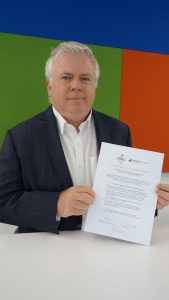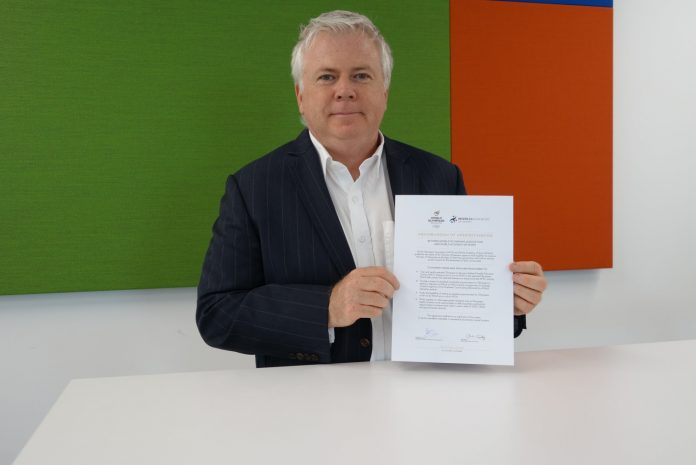Education for athletes is one of the least talked about sectors in the entire industry. However, by utilising current and ex-professionals and transitioning them into the sports business industry, athletes and organisations could see long-term benefits.
Insider Sport spoke to World Academy of Sport (WAoS) Managing Director Chris Solly about the benefits of providing education to athletes during their career and the impact it could have on business, participation and the professionals themselves.
Solly stated: “An athlete is a human being that should have the same access and opportunities in education that anyone else has both in terms of breadth or in terms of depth, whether that’s to be a doctor, lawyer, motor mechanic or a sports administrator. Obviously our network is in sports administration, so the pathway we are offering is within that.
“I think there is absolute value in athletes running sporting organisations (in the future). I remember back when I started, I was 23 and I was put in as chief executive of a national sports institute. I was probably quite good at sales, I was pretty good at management at that age, but I had no idea what I was doing in terms of the sport. There I was, trying to work with athletes when it was their lives, and so I learnt over time that my best friends were the athletes.
“If the organisations have that view when the athletes are competing, would it not be sensible to think that after they have completed their competition that they could maybe go back and run education programmes. We are starting to see that. Thomas Bach is a great example of that. He was an Olympian and he is now president of the IOC and he does a terrific job at a very difficult time.
“It would be great to see many athletes in management positions in sport and it would certainly make sense.”
Solly understands that by using the experience of an athlete and providing them with education throughout their career, it would only enhance the sports industry in the future.
In most sports, educational programmes have only recently been fully implemented. However, football can be considered an influential positive outlier with most clubs offering scholarship programmes which allow young players to still be educated while developing as athletes.
Whilst Solly highlights the importance of going into education during sporting careers, he acknowledges the fact that most athletes have the mentality of only doing it when they know that they don’t have much time as athletes left.
He explained: “We tend to think about athletes going through a transition when they finish their careers. We think that athletes go through constant transitions. When they move from one coach to another, that’s a transition. When they move from one school to another school or when they move from one programme to another programme, that’s a transition.
“So, athletes are constantly going through transitions and when you combine that with trying to keep up with their education, quite often, in some sports more than others, it’s pretty hard to combine that with the sport.”
However, Solly does go on to say that due to the global health pandemic this ideal has shifted slightly. This is due to the fact that most athletes have struggled financially during COVID-19 and so there is an increased awareness about education.
WAoS has recently partnered with the World Olympians Association in order to provide Olympians with the opportunity to gain scholarships in sports administration, offering a different pathway outside of traditional coaching and player management roles. However, whilst the relationship has only just been made official, the two entities have been intertwined for a while.

“We have worked together informally for about seven or eight years now and they have been heavily involved in our pilot programme with the International Baccalaureate to accredit schools to become athlete-friendly (allowing students to study alongside their training) along with national and international pathways,” said Solly. “So we work with some Olympians as assessors of those schools. Out of that has grown a longer term relationship which includes the sort of work we are doing at the moment to provide Olympians with scholarships.”
Additionally, WAoS works with a variety of other organisations in order to build a successful network for athletes to ensure that stability in the system is gained. The ultimate goal is to integrate education and sports practice seamlessly.
Solly added: “If you look at organisations that we work closely with, like the IOC, they have invested heavily in the past 10-15 years. They have a programme called Athlete 365 which is a great programme that provides a lot of online tools and support to athletes along with a lot of physical programmes as well.
“But that is one part of the jigsaw, if you combine that work with the stuff we are doing with the World Olympians and its another piece and as this area becomes more and more exposed the jigsaw hopefully joins up where its no longer an afterthought or a challenge and it’s just business as usual. The coach asks the question ‘how does your training go?’ Then the next question is ‘how did your studies go today?’”
Solly went on to discuss athlete participation and how offering an educational system to young athletes can help avoid the conversation with parents in which a choice has to be made between sports or qualifications. The managing director firmly believes that if time, effort and resources are put into proper educational solutions then not only will businesses and players benefit, but the level of sport will as well since more people will participate at a professional level.
He said: “I think that hopefully there will be a removal for the requirement for choice. Rather than saying ‘you either do this or that’. We know many sports where that is the case and also that varies culturally as well. In some cultures, the parents will choose sport over education, in other cultures they choose education over sport, but for us it shouldn’t be a choice. It should be that the two can be properly interlinked.
“The work that we are doing now and have been doing since the start of the Academy in 2005 is basically all geared around that. It is the reason we set the World Academy of Sport up.”
As established in the introduction, education is sport has always been seen as the forgotten topic in the industry. However, if given the resources and attention, it could prove to be a valuable part of the sports ecosystem, particularly commercially and with regards to participation.



























